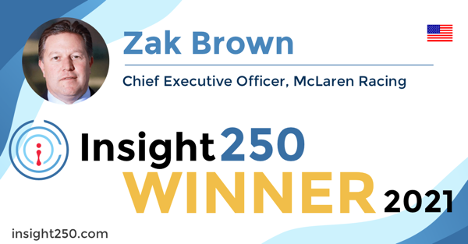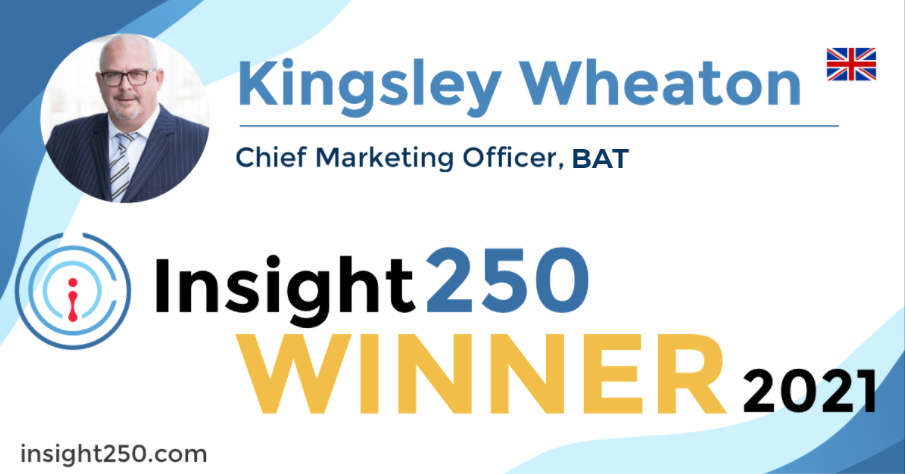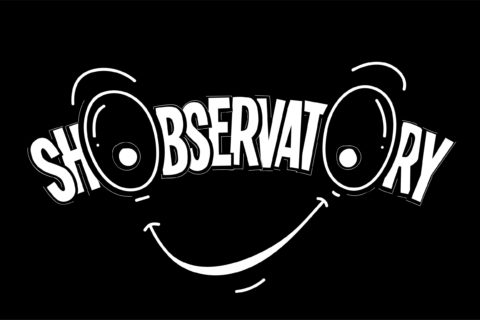


The Insight250 spotlights and celebrates 250 of the world’s premier leaders and innovators in market research, consumer insights and data-driven marketing. The inaugural list was revealed this April and created renewed excitement across the industry whilst strengthening the connectivity of the market research community.
With so many exceptional professionals named to the Insight250 it seems fitting to tap into their expertise and unique perspectives across an array of topics. This weekly series does just that; inquiring about the expert perspectives of many of these individuals in a series of short topical features.
This edition features two premier leaders of innovation and marketing who drive two of the world’s leading brands. Zak Brown is the Chief Executive Officer of McLaren Racing and Kingston Wheatley is the Chief Marketing Officer of BAT. Earlier this month (Sunday 12th September) the pair celebrated an incredible 1-2 finish for McLaren Racing at the Italian Grand Prix, Zak as the CEO and Kingsley/BAT as global partners of the McLaren Formula One team. It seemed fitting to swap the planned interview with France’s Nikki Lavoie, Founder and CEO of MindSpark Research International and Argentina’s Mariela Mociulsky, Founder and CEO of Trendsity (now scheduled for next week) to ask Zak and Kingsley how insight professionals can similarly win in the Boardroom.

As marketing increases in complexity, decision making requires precision and speed with leaders who can assess and act with immediacy. In this interview, Zak and Kingsley discuss various dimensions of achieving this and I hope you enjoy learning from them as much as I did.
Crispin: How has the role of data evolved in the boardroom and how do those presenting to the Board grab your attention and convince you to act?
Zak: “Data is critically important, however it needs a human interpretation. You can get a lot of data, some of it is extremely useful and some of it is not. So you need to understand what the important data is and what it’s telling you, and then ultimately it takes a human to be able to dissect it. But it’s important in the boardroom that when you’re making decisions, you’re basing it on a combination of experience and knowledge, and data plays a big role in that.”
Kingsley: “Looking at the role and evolution of data to begin with, there’s certainly an abundance of it today. Some might even say that, on occasion, there’s too much!
“What has evolved is the speed at which data has become available, the speed of processing it and the ability to synthesise that data. That’s down to technology and processing power. The danger, of course, can be not being able to see the wood for the trees. This is when experience, instinct and judgement come into play.
“I’m a great believer in the ‘knowledge hierarchy’ – building up from data to information, to knowledge and then to wisdom. The key is to drive decision making up the hierarchy. Decisions, of course, aren’t made purely by logic alone. If that were the case, human intervention would be redundant.
“As for grabbing my attention in the boardroom and convincing me to act, that’s a combination of belief, conviction, with a thorough and engaging demonstration of the facts.”
Crispin: What’s the balance between showing evidence and passion?
Kingsley: “Passion alone isn’t enough. But logic, in the form of data and evidence, on its own won’t get you there either. Poorly articulated data can come across as dry and robotic, ignoring the nuance that necessarily exists. So, you need evidence and passion.
“I follow the premise that management decision making is ‘making fast enough decisions in the absence of complete data.’ This is when storytelling and narrative become all-important and what makes the subject memorable.
An agency I once worked with, the famous McCann World Group, has the long-established motto ‘Truth Well Told,’ and this neatly sums up my view. It’s the powerful partnership of evidence and passion that leads to a place where alignment is forged, belief is created, and the best decisions are made.
“The best example here is our decision nearly three years ago to partner with McLaren. That decision was founded on evidence and insight – a global partnership with substantial consumer reach and excitement, as well as the plans and performance ambition of the team.
“Yet there was also the passion and belief of both BAT, in our evolving strategy and transformation, and McLaren, in terms of Zak and his team’s belief in the future. Without both of those ingredients, the partnership probably would not have been created.”
Zak: “We all have a tremendous amount of experience. Data can be both historical and show a snapshot of where you are today, but nothing beats experience and business instinct. Ultimately I think you lead with data and then you frame-up based on your passion and experience for the topic, to build whatever case it is you’re trying to build.
Crispin: What proportion of decisions have already been made before the presentation starts and how can insight professionals influence in advance?
Zak: “I always come into presentations with a clear mind of where I want to head. That being said, I’m always open minded, and when you have a group of individuals and you want their insight, you have to be open minded. So while I always come in with a direction, I’m always prepared to listen and modify or change my views based on other experiences in the room.”
Kingsley: “This is a really interesting question. I think the answer, in general, is that it depends on the situation. Some amount of alignment, in terms of getting key stakeholders and leadership lined up, can be time well spent. Personally though, I think that fewer and fewer decisions are made before the presentation starts.
“Regarding decision making, I talk a lot about ‘decision quality’ – how do you work to improve your strike rate in making the right decision. There are numerous ingredients in this ‘decision quality recipe’, including data, information and evidence as well as debate, viewpoint, past experiences, and the need for patience or speed.
“The crucial thing though, in my view, is that there is some form of cabinet/collective responsibility assumed by the team, whatever the level of seniority. You debate as much as you need to, however once the decision is made, you all line up behind that decision. I have found, through experience, that alignment can be a more powerful force, in many ways, than the decisions themselves.”
Crispin: Zak, you used to be a professional racing car driver – how has that influenced how you make decisions?
Zak: “To be a successful driver you need to have a great crew, i.e. team members around you that you trust, great equipment, and in our instance there is technology or data. And then you need to make split second decisions in a race car. In business you generally have a bit more time, but you need to make decisions nonetheless.”
Crispin: BAT is talking about A Better Tomorrow – what insight led to that strategy and what role is innovation taking in delivering?
Kingsley: “Two key insights came together when it came to framing and launching A Better Tomorrow.
“The first is that there are, rightly, increasing demands on businesses today, especially within the field of ESG. Within these demands, multi-stakeholder value is key. We understand, at BAT, as we lay out in our strategy that we must create value for consumers, employees, shareholders and society.
“Our second insight wasn’t a new one – the tobacco products BAT has traditionally sold are risky and cause harm. So, our ambition is to grow the business sustainably and in a high-growth way and to transform our company and evolve our portfolio to reduce the harm that our business causes. And that’s what A Better Tomorrow is all about.
“And that has landed very well both internally and externally. I like it, because the idea of ‘tomorrow’ is timeless. It can mean literally ‘tomorrow’, or it can suggest a year from now, or a hundred years.
“Tomorrow, as a concept for us, is a continuous journey of improvement. It never reaches a terminus, and as a business, that’s good for us because it means we continually strive to get better and better.”
Crispin: HOT TOPIC: Technology is critical in your business – will it replace people in delivering insights?
Kingsley: “Yes and no. Technology can massively speed up, among other things, data collection, analytics or interrogation of that data, and its presentation, and it can help us deliver more insights, faster and more accurately. Technology can allow you to do some things better and cheaper, or maybe do things you weren’t able to do before. Yet insights should be partnered with judgement and real-world experience to drive better decision quality. That comes from bringing remarkable insights and great people together.”
Zak: “I don’t think it will ever replace people, what I think it will do is continue to better inform people, be more insightful, have more detail and more real-time data. But I don’t see there ever being a day where technology replaces people, because it’s people that lean into technology to make more informed decisions.”
Crispin: What would each of your “top tips” be to readers?
Zak: “Mistakes are OK, learn from them so you don’t make the same one twice.”
Kingsley: “I always liked the David Ogilvy line about relying too much on research by using it like a lamppost for support, rather than for illumination. So, my tip is to try and use research, data and insights, as much as you are able, for illumination and not for support.”
Thank you Zak and Kingsley, and congratulations again on your success in Italy. Here’s to many more wins on and off the track for you and us all.


